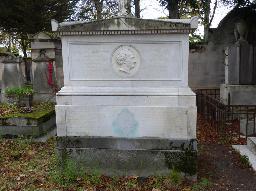Smith, Sidney |
| ADMIRAL (ENGLAND) |
|
BORN 21 Jun 1764, London - DIED 26 May 1840, Paris BIRTH NAME Smith, William Sidney GRAVE LOCATION Paris: Père Lachaise, Rue du Repos 16 (division 43, ligne 01, N, 22) |
|
Sidney William Smith was the son of Captain John Smith of the Guards. His mother Mary Wilkinson was a daughter of the merchant Pinckney Wilkinson. He joined the navy in 1777 and fought in the American Revolutionary War. He distinguished himself during the Battle of the Chesapeake in 1781 and during the Battle of the Saintes in 1782. After the peace of Versailles in 1783 he travelled in France, Spain, and Morocco. In 1790 he joined the Swedish navy in the war with Russia. He was knighted by the king of Swedish afterwards. In 1793 he saw action against Napoleon Bonaparte who attacked and conquered the harbour of Toulon that was occupied by British forces. Several war commissions followed until he was captured in Le Havre together with his secretary John Wesley Knight. He was held for two years until the Royalists facilitated his escape. After that he served in the Mediterranean. In 1799 he successfully defended Acre against Napoleon's troops. After his return to England in 1801 was elected Member of Parliament for Rochester in 1802. He probably had an affair with Caroline of Brunswick, the wife of the Prince of Wales. From 1803 he worked on the defence of Great Britain against a possible French invasion. In 1805 he was promoted to Rear Admiral and he returned to the Mediterranean. In 1807 he was sent to Lisbon. He escorted the Portuguese Royal Family successfully to Brazil. In 1810 he married Caroline Rumbold, the widow of the diplomat Sir George Rumbold. In 1812 blocked the port of the Toulon, but the French did not try to break out. After Napoleon's abdication in 1814 he returned to England. He attended the ball of the Duchess of Richmond on 15 June 1815 and on 18 June he met the Duke of Wellington immediately after Napoleon was beaten. In 1815 he was made a British KBC, many years after his Swedish knighthood. He attended the Congress of Vienna to campaign for action against the Barbary pirates who enslaved captured sailors. By that time, he had considerable debts, both from outstanding payments by the British government and because of his own lifestyle. He moved to France with his family to avoid imprisonment for debts and settled in Paris. After the government finally paid him and increased his pension his finances improved. He died in Paris in 1840. Related persons • was opponent of Ver Huell, Carel Hendrik |
Sources • Winkler Prins Encyclopedie (editie 1909), 1909 • Sidney Smith (Royal Navy officer) - Wikipedia (EN) |



